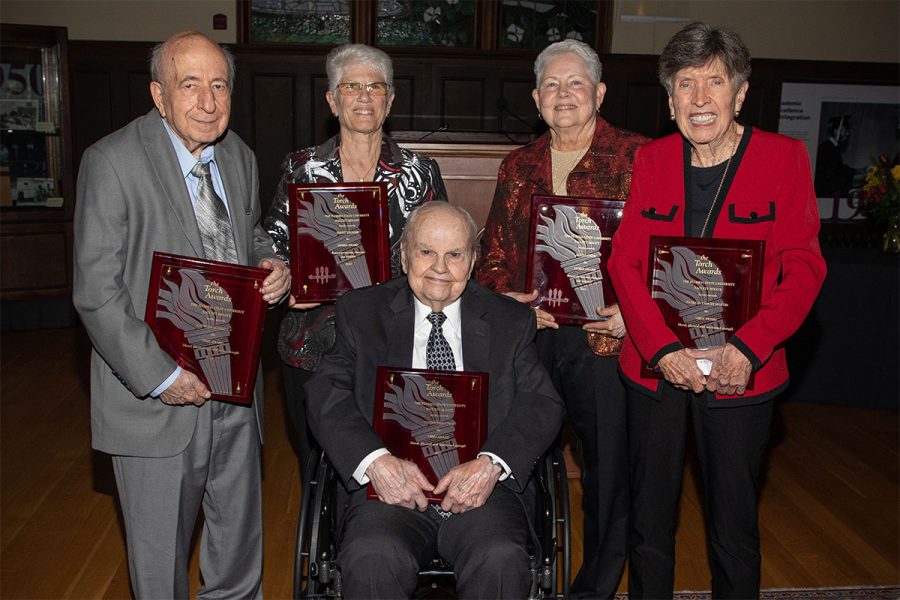
Florida State University’s Faculty Senate honored five members of the university community with Torch Awards in recognition of their contributions to the university’s academic excellence during a ceremony held Thursday, Feb. 16, at the Heritage Museum.
“These individuals have contributed to the academic excellence of our university in myriad ways,” President Richard McCullough said during his remarks. “They believe strongly in our mission and care deeply about our faculty, staff and students. Put simply, they love Florida State University.”
Provost James Clark presided over the ceremony while FSU Trustee and Faculty Senate President Eric Chicken presented the awards.
The Faculty Senate Torch Awards were established in 1996 as a way for faculty to honor those friends of Florida State University who have made sustained and significant contributions to the university’s ability to fulfill its academic mission. To date, 102 people have been recognized with Torch Awards.
Awards are named for the three torches depicted in the FSU seal. The three categories of Torch Awards are: Vires, representing moral, physical and intellectual strength; Artes, conveying an appreciation of aesthetics and the beauty of intellectual pursuits; and Mores, symbolizing respect for customs, character and tradition.
This year, the Faculty Senate bestowed three Vires and two Mores awards.
The 2022 winners are:
Vasken Hagopian (Vires)
Professor Emeritus Hagopian is a world-renowned physicist and was an esteemed member of the FSU faculty for 39 years before his retirement in 2008. He co-authored more than 600 publications, taught physics and astronomy courses to thousands of students, and mentored countless more.
Many of his students went on to teach at universities around the world or serve as leaders at prestigious national laboratories — a testament to his excellence as a teacher.
Hagopian was the face of FSU in the high energy physics community, and in the early 1990s, he led FSU to the CMS experiment at CERN, the European physics laboratory. This is now one of the most important experiments in the world.
Along with his wife, Sharon and his family, Hagopian has remained committed to ensuring the success of students, creating the Hagopian Family Endowment at FSU, which gives annual awards to graduate students working in high energy physics.
Clifford Madsen (Vires)
Madsen served as a distinguished member of the FSU faculty for 62 years until his retirement last May from the College of Music. He is believed to hold the record as the longest employed professor at Florida State University.
During his tenure, Madsen served as a trumpet teacher, band conductor for the Marching Chiefs, classroom instructor, adviser and mentor. He also wrote 221 publications, gave 376 paper presentations and authored eight books — a truly impressive and unparalleled record of research in his field.
Madsen also taught hundreds of undergraduate and graduate classes, advised over 100 doctoral dissertations and served on many more masters and doctoral committees. He was well known for the hours he would spend mentoring students and ensuring they were set on a path to success.
In 1988, he was named a Robert O. Lawton Distinguished Professor in recognition of his distinction in his field. He also was given two special commendations from the Faculty Senate — one for 50 years of service, and another for cumulative service after being elected to the Faculty Senate in 1965 and serving until his retirement.
Patricia Martin (Vires)
Martin is one of the country’s most distinguished gender scholars and is known worldwide for her scholarship on violence against women and on the dynamics of employment discrimination.
She earned her master’s and doctoral degrees in sociology from FSU, then joined the faculty as an assistant professor, rising through the ranks to earn a named chair and become an internationally renowned scholar. Martin has written scores of influential articles and several award-winning books and is known for being a supportive colleague, generous adviser and mentor to countless students.
Martin also made a profound impact through her history of remarkable activism at FSU. She was a trailblazer in the push to end employment discrimination against women at FSU. In her drive for equality, she served on university committees where she fought for equal funding for women’s athletics and equal inclusion in leadership.
Also a philanthropist, Martin’s donation of coastal property has helped FSU further its goals. She also helped found and financially support the city’s domestic violence shelter.
Janet Stoner 2022 (Mores)
Alicia Crew 2022 (Mores)
Together, Stoner and Crew have led the effort to ensure the university’s history and traditions are recorded and honored, and they were instrumental in the creation and continued growth of the University Archives and the Heritage Museum.
Stoner and Crew personally sifted through records and irreplaceable artifacts, ensuring their preservation and guaranteeing students, faculty and the university community access to FSU’s rich history. Today, the University Archives fields hundreds of information requests and the museum sees thousands of visitors every year.
Stoner and Crew also have shown incredible commitment to young women in their pursuit of academic excellence. To that end, they helped create the Champions Beyond the Game annual breakfast for female athletes, where successful alumni share with current students the impact FSU women’s athletics has had on their lives. Their work extends to the Women’s Leadership Institute where they ensure that the program has financial support, find unique speakers for events, and connect students with mentors.
Stoner’s service on the Arts and Sciences Council and the FSU Foundation’s Board of Trustees and Crew’s involvement with Seminole Torchbearers and Campus Recreation, also have contributed to student leadership and success at the university.




